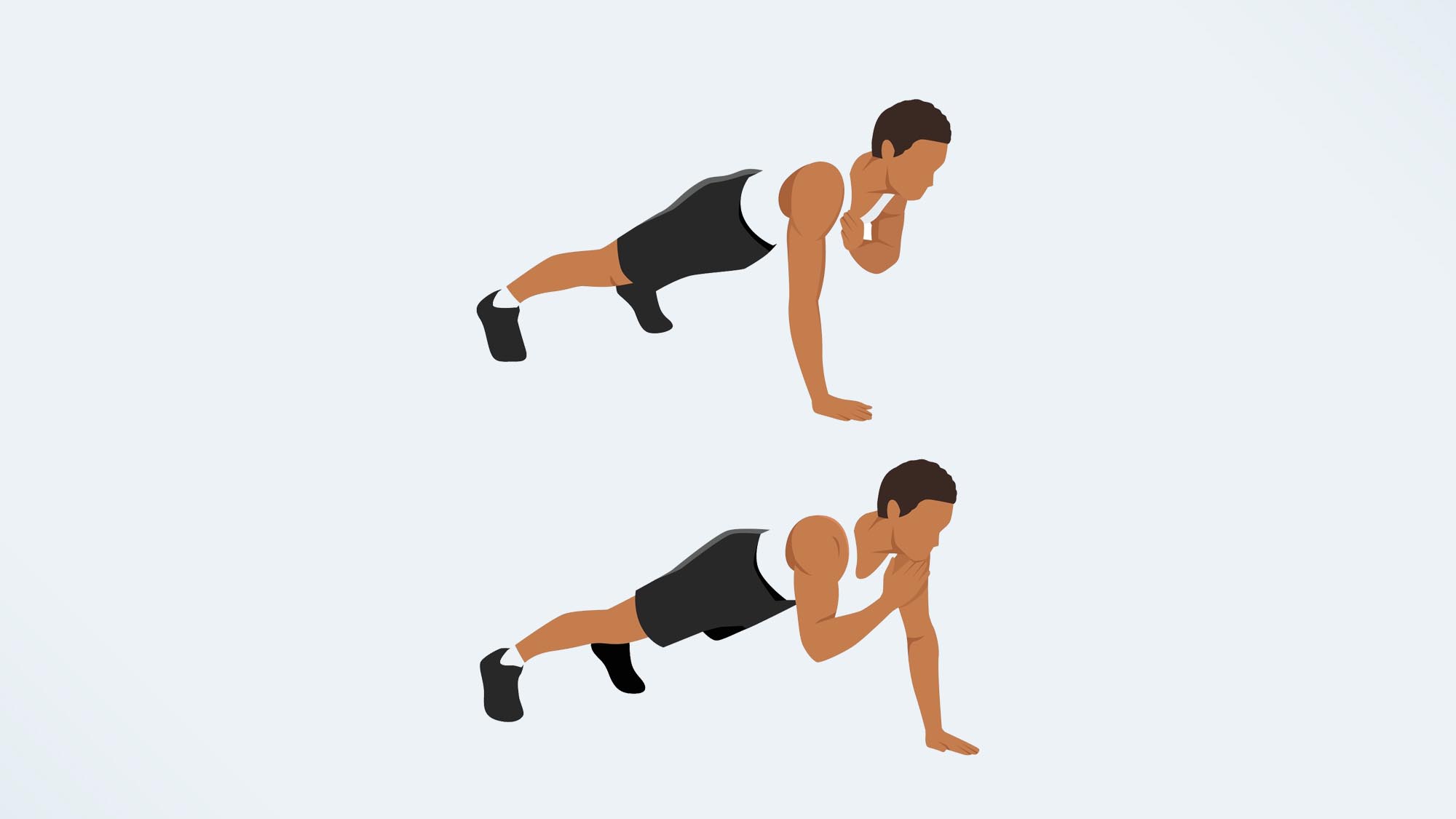
If you’ve ever done a plank exercise, chances are it’s not your favorite workout — especially when forced to hold it for anything longer than a minute. While it might appear straightforward, performing a plank with proper form is more difficult than you think. Engaging numerous muscle groups simultaneously and retaining the focus to not lower yourself back to the ground, it’s a deceptively challenging exercise.
Sure, planks can be pretty gruelling, but there’s a reason why they’re so popular with PTs, trainers, and fitness enthusiasts alike. Not only does the exercise require zero gym equipment and can be performed anywhere, but it works the entire body, targeting muscles of the upper body, core, and lower body simultaneously.
And if the plank alone wasn’t challenging enough, there’s a dynamic variation of this notorious exercise to make it that bit harder, should you wish to try it — the shoulder tap plank. Taking the traditional plank to the next level, the plank shoulder tap requires you to hold the standard plank position but further test your stability by taking away the support of the hands, alternately, throughout the exercise.
Intrigued by the potential benefits — of a stronger core and potentially more pronounced abs, for one — and what that outcome might look like, I decided to challenge myself by performing 50 plank shoulder taps every day for a week. Here’s how I got on.
Why plank shoulder taps?
To get a better idea as to why anyone might want to integrate numerous shoulder tap planks, daily, into their workout routine, Tom’s Guide spoke with Peloton instructor, PT, and sports therapist, Joslyn Thomson Rule.

Joslyn Thomson Rule is a Peloton instructor, PT, and sports therapist who has over 17 years of experience.
I asked Thomson Rule how I should best approach this challenge and what the benefits of doing 50 shoulder taps every day a week might achieve. She told me that, since the exercise, when performed correctly, is not too taxing on the body, daily practice would be perfectly feasible.
“[Plank shoulder taps] create a connection to the core, which serves as a great pre-workout warm-up for aerobic exercise and any load-bearing exercises to establish that core connection. [They are also] a great addition to any movement practice long term.
Sign up to get the BEST of Tom's Guide direct to your inbox.
Get instant access to breaking news, the hottest reviews, great deals and helpful tips.
“For someone new to shoulder taps, I would advise a solid plank base first, and it would be fine to break the 50 reps up throughout the day. Perhaps try 5 x 10 reps at first, until longer efforts feel more comfortable.”
Thankfully, I don’t consider myself a newbie to this exercise, so I knew that — while it would be challenging — I should be able to manage 50 plank shoulder taps per day without sustaining injury.

I also learned that doing a week-long plank shoulder taps challenge might aid overall balance and coordination, since maintaining a stable plank position while tapping your shoulders forces your core to work harder and keep your body aligned. This is said to improve stability and proprioception, which can benefit various fitness activities.
However, I hoped that — by performing 50 plank shoulder taps daily — I would build core strength, tone my upper body and give my abdominal area a bit of a definition boost. But could this be achieved in just one week?
How to perform a plank shoulder tap
According to Thomson Rule, a shoulder press can be properly performed by following these simple steps:
- Step 1: Hold a top plank position either on your knees or feet (the latter is harder)
- Step 2: Engage your core muscles by drawing your belly button towards your spine.
- Step 3: Maintain a neutral spine and avoid sagging or arching your back.
- Step 4: Keep your shoulders relaxed and away from your ears.
- Step 5: Slowly tap the opposite shoulder with the opposite hand while maintaining a solid plank position. For example, tap the right shoulder with the left hand and then repeat the same on the opposite side, alternating for a period of time.

“This is a great way to connect to your core,” adds Thomson Rule. “The shoulder taps force you to keep the movement slow and controlled, as faster tempos will allow too much movement in the hips, which for this exercise, is not the goal.”
By performing plank shoulder taps in this way, and with the correct form, she says you’ll maximize their effectiveness while preventing injury.
It's important to be mindful of the common mistakes people make during plank shoulder taps as this will also help to prevent injury. Some errors to watch out for include:
Allowing your hips to sway or rotate excessively: This can strain your lower back and compromise the effectiveness of the exercise. Instead, focus on keeping your hips stable and in line with your body throughout the movement.
Rounding your shoulders or collapsing your chest: This can lead to poor posture and potential shoulder injuries. Ensure that your shoulders are squared and away from your ears, maintaining a strong and stable upper body.
Holding your breath: It's common for people to unconsciously hold their breath during challenging exercises. Remember to breathe steadily and deeply throughout the movement to provide your muscles with the oxygen they need.
I did plank shoulder taps for a week — here’s what happened
So, how did I get on with my “50 plank shoulder taps every day for a week” challenge? Let me give you the lowdown, day by day.
Day 1
I’m no stranger to a good old plank or two, but upon starting this challenge, I realized I’d not really done this exercise for some time. It was therefore a little more challenging than I’d anticipated to perform 50 in one go. As soon as I assumed the plank position, my core and upper body muscles were immediately engaged, and maintaining proper form while tapping my shoulders required quite a bit of concentration. I wasn’t even halfway through when I felt a deep burn in my abs, and by the end of the workout, my shoulders were pretty fatigued. I managed to complete the set, but it definitely wasn’t easy!
Day 2
The second day felt much like the first, except I was feeling a little sore in the core from the day before. At least I knew it was having some impact on my body.
Day 3
By the almost-halfway point, I began to feel more comfortable in my ability to perform the plank shoulder taps without wanting to have a little rest in between. I could feel my core muscles working harder, too. Soreness was still present though, perhaps even more so than the previous day.
Day 4
On the fourth day, I started to notice some improvement in my form and endurance. Although the exercise remained challenging, it felt smoother and I noticed slight improvements in my stability and balance. My core felt subtly stronger, too, and I was able to maintain better control during each tap. I was certainly starting to adapt to the challenge by this point.
Day 5
As I entered the second half of the week, my muscles no longer struggled as much during the 50 shoulder taps, and my mind felt more focused. The exercise had become less physically demanding, and I was more easily able to concentrate on engaging the correct muscles throughout.
Day 6
The penultimate day of the challenge brought mostly fatigue. My core muscles felt stronger but my body felt tired. I was also feeling a little bored of having to perform the same workout again. The upside, however, was that the movement had become ingrained in my muscle memory, allowing me to tap my shoulders with precision without having to think too much about it.
Day 7
By the final day of the challenge, the exercise seemed almost effortless compared to the beginning of the week, like a regular part of my fitness routine. My core felt more solid and my overall stability and balance had seemed to improve. At the same time, I was relieved to not have to do so many shoulder taps again anytime soon.
So, the million-dollar question: what was the overall result — did the challenge give me better ab definition?
Since I didn’t really have much definition in that department to start with, I can’t say that I saw too much of a difference in the overall appearance of my abs. I noticed a slight pump in my arms, pecs, and abs in the mirror immediately after the workout but this subsided within an hour. Perhaps if I continued to integrate this exercise into my daily routine long term, this slight definition might become more of a permanent thing.
On the other hand, it’s a well-known fact that — when it comes to the torso — nutrition always has the upper hand. While core-based exercises like planks help to strengthen and build the core muscles, a calorie deficit is what’s really needed to lose fat and offer definition. Still, if you’re in the market for the best ab definition workouts, check out our guide.
Would I do it again?
Through consistent effort and proper form, I certainly noticed improvements in my core strength, upper body definition, stability, and balance after a week of 50 daily plank shoulder taps.
While the benefits were evident, it did feel like a bit of a chore to do the same exercise each day, and I do believe that, in fitness, resting your muscles between working them is important in allowing for properly recover and growth.
That being said, I do believe that it would have been better to start with a lower number of repetitions and gradually increase them each day to allow my body to adapt and progress more steadily. Starting with 50 reps right away proved to be quite demanding, and a more gradual approach would have been more sustainable and potentially yielded even greater benefits.
So, would I be willing to take on this challenge again in the future? I’m not so sure.
Instead of dedicating myself to performing the same exercise every day, I think a slightly lower number of sets, perhaps 20-30, three times a week (in addition to my usual weights-based workout routine) would not only be more sustainable, but more rewarding long term.
More from Tom's Guide
Lee Bell is a freelance journalist and copywriter specialising in technology, health and fitness and how the latest innovations are shaking up the lifestyle space. From national newspapers to specialist-interest magazines and digital titles, Lee has written for some of the world’s most respected publications during his 12-plus years as a journalist.

